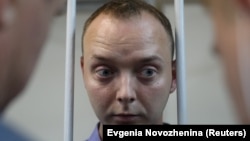Czech intelligence and defense officials have rejected Moscow’s allegations that former Russian military journalist Ivan Safronov, a Russian space agency aide, passed secret information about Russia’s military capabilities on to Prague.
Speaking on condition of anonymity, an employee of the Security Information Service, the Czech intelligence agency responsible for national-security matters, said on July 8 that Safronov had no connection with the agency. Similarly, an informed source in the Czech Defense Ministry told Current Time that the ministry has no information about any possible cooperation with Safronov.
Safronov, a 30-year-old former reporter who had covered Russia’s military-industrial complex, was detained in Moscow on July 7 on suspicion of treason. The Federal Security Service (FSB), the rough equivalent to the Soviet KGB, believes that he has worked with Czech intelligence over several years.
One of Safronov’s defense attorneys, Yevgeny Smirnov, told AFP that the FSB believes Czech intelligence works at the U.S.’ behest.
Moscow claims that Safronov provided the Czech Republic with data about Russia’s arms deliveries to African countries and information about Russian armed forces’ activities in the Middle East.
The Czech Republic’s foreign intelligence service, the Office for Foreign Relations and Information, declined to comment to Current Time about the case. The Czech Foreign Ministry earlier also stated that it will not respond to Moscow’s claims.
Safronov, who faces a potential 20 years in prison, maintains his innocence. He will remain in detention for two months.
His prosecution has raised alarm about the possible repercussions for Russian media’s ability to report on the military or government. On July 7, police searched the apartment of one of Safronov’s former Kommersant colleagues, Taisiya Bekbulatova, the editor-in-chief of the independent online journal Kholod (Cold).
Moscow police have detained approximately 30 journalists who staged one-person pickets outside the Federal Security Service’s headquarters in response to Safronov’s detention.
President Vladimir Putin’s spokesman, Dmitry Peskov, however, has stated that Safronov’s detention “is not connected with his journalism activities.”
The U.S. embassy, though, has tweeted that Safronov’s detention, following the prosecution of other journalists, makes it look as if Moscow is running “a concerted campaign against #MediaFreedom.” The Russian Foreign Ministry counter-tweeted on July 7 with a curt “Mind your own business.”
For less than two months, Safronov has worked as an advisor to the head of Roskosmos, Dmitry Rogozin. There, he handled Roskosmos’ PR policies, including for its subsidiary companies, and oversaw some special programs. Rogozin has stated that Safronov had no access to secret information at Roskosmos.
Before joining Roskosmos, Safronov had worked primarily for the influential daily Kommersant since 2010. He was fired from Kommersant in 2019 after writing an article about the possible resignation of Federation Council Chairwoman Valentina Matviyenko, a close ally of President Vladimir Putin. He later joined the daily Vedomosti.
His articles regularly touched on sensitive military matters. A March 18, 2019 Kommersant story about Russia’s alleged plans to sell fighter jets to Egypt was followed by a U.S. threat to impose sanctions on Egypt. (Kommersant has since removed the article from its site.) A July 3, 2019 story for the Russian version of Forbes attributed a devastating fire on board the Russian nuclear submarine Losharik to the possible failure of an accumulator battery. Аn October 20, 2019 story for Vedomosti revealed that one “obsolete” intercontinental ballistic missile had failed to fire during military exercises overseen by President Putin.
Safronov is the son of former Kommersant military columnist and reporter Ivan Safronov, a retired nuclear-missile-forces officer, who, in 2007, was found dead outside his apartment entrance. He reportedly had been researching the alleged sale of Russian arms to Iran and Syria via Belarus. Police saw no grounds for a criminal investigation, but the exact cause of his death remains unclear.
-With additional material from TASS and France24






Facebook Forum